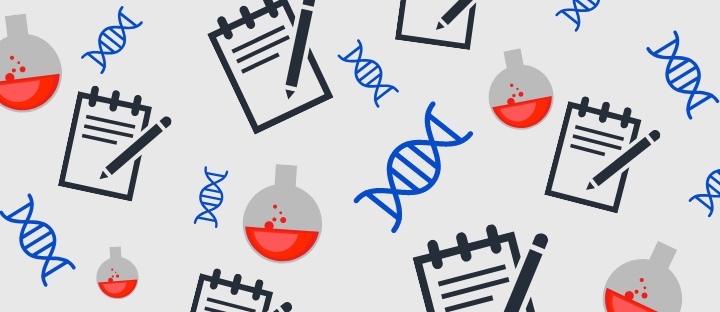#ScienceSaturday posts share exciting scientific developments and educational resources with the KAND community. Each week, Dr. Dylan Verden of KIF1A.ORG summarizes newly published KIF1A-related research and highlights progress in rare disease research and therapeutic development.
KIF1A-Related Research
Genetic Alterations in a Large Population of Italian Patients Affected by Neurodevelopmental Disorders
We often talk about genetic disorders in the context of mutations that change a protein’s function, like missense mutations that change a single amino acid in KIF1A. But even a healthy version of a protein can be harmful if there is too much or too little of it. When a mutation causes a deletion or duplication of larger areas of DNA, we call it Copy Number Variation. Down Syndrome is an example of a neurodegenerative disorder caused by Copy Number Variation – specifically, extra copies of some or all of the genes on chromosome 21. The altered expression of so many genes has profound consequences for the nervous system.
DNA deletion and duplication may impact large sections of genes, or multiple neighboring genes. These were thought to be quite rare, but as our methods of detecting Copy Number Variations advance, we can identify, and understand the consequences, of these deletions and duplications.
The Study
In this week’s study, researchers in Italy used a technique called array-comparative genomic hybridization (a-CGH) to detect Copy Number Variation in 1800 children and teenagers diagnosed with “[Autism Spectrum Disorder, Intellectual Disability], speech delay, psychomotor developmental delay, ADHD, epilepsy, schizophrenia, and other neurological disorders.” The authors noted that these disorders have significant symptom overlap, with many patients having multiple diagnoses.
Copy Number Variants were prevalent in this group, with 2914 observed. 1750 were deletions, while 1164 were duplications.
Of all copy number variants, 208 were known to be pathogenic (harmful), 504 were benign (non-harmful), and a 2202 were Variants of Uncertain Significance.
The analysis found a KIF1A mutation in one 15 year old patient with autism spectrum disorder: a duplication from intron 27 to exon 46 of the KIF1A gene. This roughly correlates to amino acids 994 to 1675, which includes KIF1A’s stalk and its cargo-binding Pleckstrin Homology (PH) domain). This mutation was a Variant of Uncertain Significance, but noted to be a Strong Syndromic Candidate by the authors.
As our genetic analyses advance, studies like this highlight the value in reassessing established disease populations. By coordinating the use of array-comparative genomic hybridization with other next generation sequencing techniques we can expand access to more accurate diagnoses.
Rare Roundup
Columbia Receives $15M for Ultra-Rare ALS Medicines Creation
Gene-based therapies like Antisense Oligonucleotides have taken major strides in recent years, including Susannah Rosen’s current n-of-1 ASO trial. In the wake of this success, a major question faced by our community and others like ours is how to scale access to these solutions.
Amyotrophic Lateral Sclerosis is a neurodegenerative motor neuron disorder in which muscles progressively weaken. It is a heterogeneous disorder, and genetic testing of ALS patients has identified many contributing genes, including KIF1A. KIF1A-Associated ALS causes gait imbalances and sensory neuropathy, and unlike most KAND cases is caused by mutations in the cargo-binding domain.
The program is being funded by the Ultra-rare Gene-based Therapy (UrGenT) Network to create ASOs that can knock down ALS-associated genes, creating a platform to expand development of, and access to, gene-based therapies.
ALS information provided by Ada Lyu
Ada Lyu is a graduate student completing her master degree at Columbia University. She graduated from UC San Diego with a B.S. degree in human biology in 2023. Her undergraduate research focused on lipid metabolism of NASH at UCSD Medical School and DNA breakage and repair mechanism at Scripps Research. Lyu is currently working in a lab at Columbia University Irving Medical Center studying the influence of cholesterol on cardiovascular health.

